A centrifuge is an essential device with many applications across many industries. One of the industries is medicine, which is used in diagnostic laboratories to facilitate the treatment of diseases and other analyses. There are many centrifuges to choose from in the market, but the Eppendorf Centrifuge stands out. While finding a centrifuge that meets all your needs, the Eppendorf bridges this gap and offers value for money. Find out more about this centrifuge and some of the different types available.
Eppendorf is a household name regarding scientific research and innovative technology that provides various products that have revolutionized science research practices. It has been in business for over 25 decades, attributed to its understanding of daily laboratory routines and predicting future trends. Eppendorf is well known for its reliable performance and creative designs, with its German engineering that ensures durability.
The market for Eppendorf primarily consists of commercial research laboratories and academic researchers in clinical laboratories, forensics, pharmacy, biotechnology, and chemical and food industries. Its centrifuges fulfill the demands of various applications by different users.
What is Eppendorf centrifuge?
The centrifuge is a motor-driven device that separates the various components of a fluid by spinning the fluid at high speed within a container. It applies a centrifugal force created by a rotor and enables the components to separate because they have different densities.
The first Eppendorf Centrifuge introduce in 1964. There is a wide range to satisfy the different user needs and applications, including the Eppendorf Mini spin, Eppendorf Centrifuge 5810r, 5424, 5702, 5804, 5430, and the Eppendorf Vacufuge plus.
The basic structure features a rotor, control system, driving system, security protection system, the main rack, and sometimes a refrigeration system. It is crucial to consider the characteristics of a centrifuge, such as the maximum RPM (Revolutions per minute) and RCF (Relative centrifugal force), temperature range, and other logistical factors.
It is commonly used in chemical tests, environmental protection, food, and pharmaceuticals and is one of the best in the industry, offering easy operation and various features.
What is a centrifuge used for?
A centrifuge is used in laboratories to separate various fluids, liquids, or gases. In hospitals, it’s used to separate the supporting liquid from the body particles in body fluids such as blood and urine, which examine for disease diagnosis.
It is effective in isolating contaminants present in body fluids. Centrifuges also use in other applications, such as separating cream from milk in dairies to form skimmed milk.
Centrifuges are used in industries to process waste by separating suspended solids from the liquid, and washing machines draw water from fabrics, chalk manufacturing, dewatering and stabilizing wine, and gases for isotope separation.
How Does a Centrifuge Work?

A centrifuge works by spinning a sample at a rapid speed in a fixed rotation axis, applying a strong force perpendicularly to separate substances that compose a sample, therefore applying centrifugal force. It works using the sedimentation principle and depends on the particles’ size and densities, the medium’s viscosity, and the rotary speed.
Substances separate naturally by gravity due to different densities, such as the pulp settling at the bottom of a glass with the liquid juice on top.
The process by gravity is very slow, which is why the centrifugal force is used to fasten the process by applying acceleration to the sample. Centripetal acceleration causes denser particles to radiate outwards while the lighter substances move toward the center.
In the laboratory, the denser particles settle at the bottom of the tube while the less dense ones move to the top. There are various separation techniques, such as density gradient, phase separation, pelleting, ultrafiltration, and isopycnic. Pelleting is the most commonly applied.
Eppendorf Centrifuge Equipment for Modern Laboratory
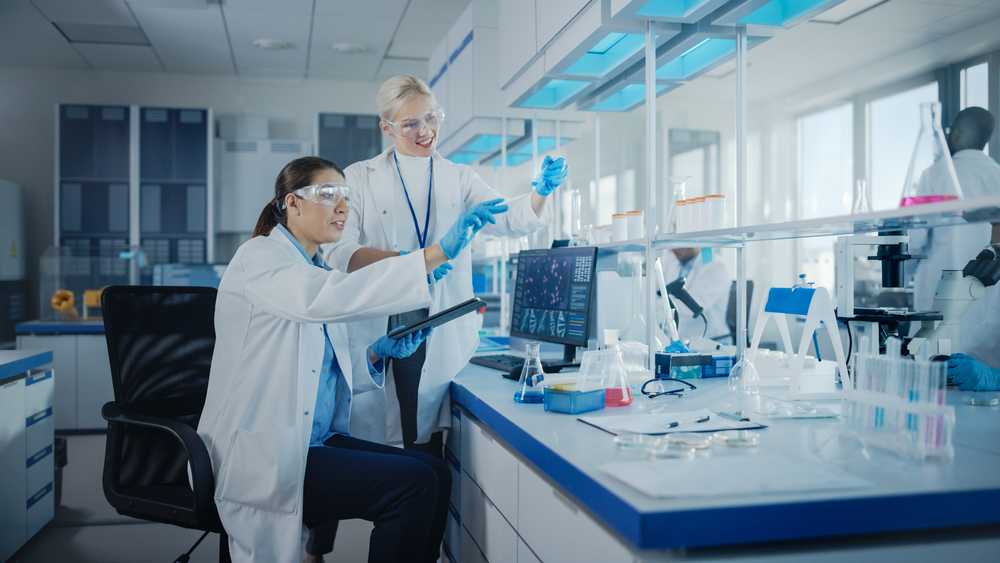
Eppendorf offers the latest in centrifuge technology for your lab. Eppendorf Centrifuge Equipment is the perfect solution for all micro-sample applications, such as separating cellular materials, RNA/DNA, and peptides. Eppendorf centrifuges are designed to deliver ultra-fast performance, making it easier to separate samples quickly and accurately in labs and research organizations.
The advanced design of Eppendorf Centrifuge Equipment allows for simple operation and precise control over your samples’ speed, duration, acceleration, and deceleration. With additional safety features to protect against misuse or accidents, we ensure that every sample stays safe throughout the process.
Eppendorf centrifuges offer superior temperature management to ensure that every sample you work with is treated each time ideally.
Simply put, Eppendorf’s Centrifuge Equipment offers reliable performance while helping to maximize laboratory productivity. So if you’re looking for a top-of-the-line centrifuge that reduces the time needed to process samples while offering superior sample management, trust Eppendorf to get the job done right!
Here is Centrifuge from Eppendorf used for advanced analysis in research organizations and specialized labs.
1. Eppendorf centrifuge 5810 R ($8,775.00)

The Eppendorf Centrifuge 5810r is one of the smallest reliable benchtop centrifuges with a compact footprint and speeds of up to 14000 RPM and 20913 x g RCF.
Eppendorf Centrifuge 5810r has a high capacity for tubes, bottles, and plates such as deep-culture, deep-well, and PCR, with a plate rotor, swing-bucket rotor, and adapters that facilitate loading. It allows for bottles and tubes of 0.2 – 750ml. It also has a fixed-angle rotor that accommodates 0.2 – 85ml tubes.
5810r from Eppendorf Centrifuge operates quietly and fits comfortably into any lab. It also has a low access height of 29cm for comfortable loading and unloading, a soft-touch lid closure, and an aerosol-tight cap for easy operation.
The Eppendorf centrifuge 5810r has an imbalance detection and automatic rotor recognition for maximum safety during operation and refrigeration. The capabilities of temperatures between -9˚C and 40˚C to ensure that the samples stay cool, with Dynamic compressor control capabilities to optimize cooling.
It has an ECO shut-off that becomes active after 8 hours of no use to reduce energy consumption. It is the most worthwhile choice for medium to high throughput uses and comes with a 2-year warranty for parts and labor.
2. Eppendorf centrifuge 5425 ($1,919.00)

The Eppendorf Centrifuge 5425 and 5425R are premium microcentrifuges designed to provide maximum efficiency, precision, and ease of use in molecular and cell biology applications. With ergonomic controls, a whisper-quiet operation, and a maximum speed of up to 21,300 × g, the performance of these centrifuges is second-to-none.
The 5425 R offers precise temperature control even when handling delicate samples, making it the perfect choice for researchers working with temperature-sensitive materials. The diverse range of rotors available provides flexibility when selecting the right tool for specialized applications – allowing you to get the most out of your samples.
Designed with usability in mind, the Eppendorf Centrifuge 5425 series provides reliable performance and exceptional convenience for every user level. With a robust design and simple operation, these centrifuges are an invaluable addition to any laboratory. Join thousands of satisfied customers today and experience quality lab work at its best.
3. Eppendorf centrifuge 5702 ($2,292.00)
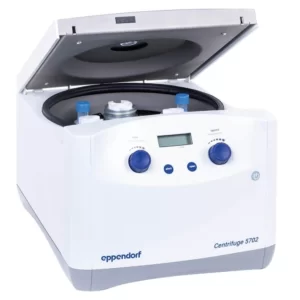
This is a general-purpose centrifuge of low speed, with a maximum of 4400 RPM and 3000 x g RCF. It operates quietly and has six different rotor choices that cater to different types of tubes and requirements. It has a compact footprint that can easily fit on any bench and a low access height for comfortable loading and unloading.
The Eppendorf Centrifuge 5702 has an electronic imbalance detection for ultimate safety and a SOFT brake function to slowly accelerate and brake.
It is easy to use, delivers precise results while maintaining the accuracy of the samples, and has an ‘At Set RPM’ function that offers consistent centrifugation runs by starting the timer when the chosen rotational speed is reached. It does not have refrigeration technology. It is suitable for labs that require low to medium output, perfect for clinical and cell culture labs. It has a 2-year warranty for parts and labor.
4. Eppendorf centrifuge 5804 / 5804 R ($3,517.00)
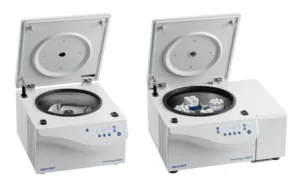
This reliable Eppendorf centrifuge has a high speed of up to 14000 RPM and 20913 x g RCF. It operates quietly and is versatile, with a wide range of rotors and adapters suitable for tubes, bottles, and plates. The swing- bucket, and adaptors allow for bottles and tubes ranging from 0.2 to 250ml, while the fixed-angle rotor allows for 0.2 to 85ml.
The plate rotor accommodates standard multiwall plates such as deep-well, PCR, MTP, and cell culture. The centrifuge lid has a soft-touch lid closure, a compact footprint, low access height of 29cm for comfortable loading and unloading, and an imbalance detection and automatic rotor recognition for optimum safety.
Eppendorf centrifuge 5804 has a timer of I minute to 99 minutes and 35 user-defined programs. It does not have refrigeration capabilities. It is suitable for medium capacity needs for molecular applications.
5. Eppendorf centrifuge 5430 / 5430 R ($2,907.00)
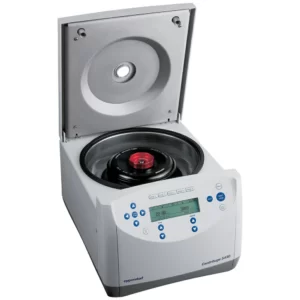
Eppendorf centrifuge 5430 is a multipurpose, high-speed microcentrifuge with a maximum speed of 17500 RPM and 30130 x g RCF. It offers centrifuge rotors not only for Eppendorf tubes but also for microplates and 15 or 50ml tubes, with a maximum rotor capacity of 48 x 1.5/2.0ml, 6 x 50ml, and 2 x MTP.
5430 Eppendorf Centrifuge has 12 different rotors, a compact footprint, a low access height that makes it convenient to the user, and a soft-touch lid closure ergonomic operation.
The aerosol-tight rotors close with a quarter of a twist which does not strain the wrist and saves time in everyday use. It has an advanced operating system with a multilingual functional menu featuring English, French, German, and Spanish, with a large, backlit display. The menu allows the user to save five program keys and up to 99 predefined programs for easy routine access. It has a 2-year warranty for parts and labor.
Conclusion
The Eppendorf Centrifuge goes beyond the basic functionality of centrifuges and ensures that the customers’ needs are met. It offers ergonomic operations to ease the handling of the instrument, which is also easy to use without compromising the reliability and consistency of results.
Its extensive experience allows it to provide top-notch products to its users, from microcentrifuges to large floor-standing devices.
If you’re in the market for a centrifuge, there’s no need to look further than Eppendorf. With over 25 years of experience, they know what it takes to make a reliable and durable product that will meet your needs. Centrifuges from Eppendorf are perfect for micro-sample applications, so you can be sure your research is getting the best possible results. Plus, with German engineering at its core, you can trust that your centrifuge will stand up to even the most rigorous use.
So why choose Eppendorf? Because when it comes to laboratory centrifuges solutions, they set the standard.
Reference:
https://www.eppendorf.com/

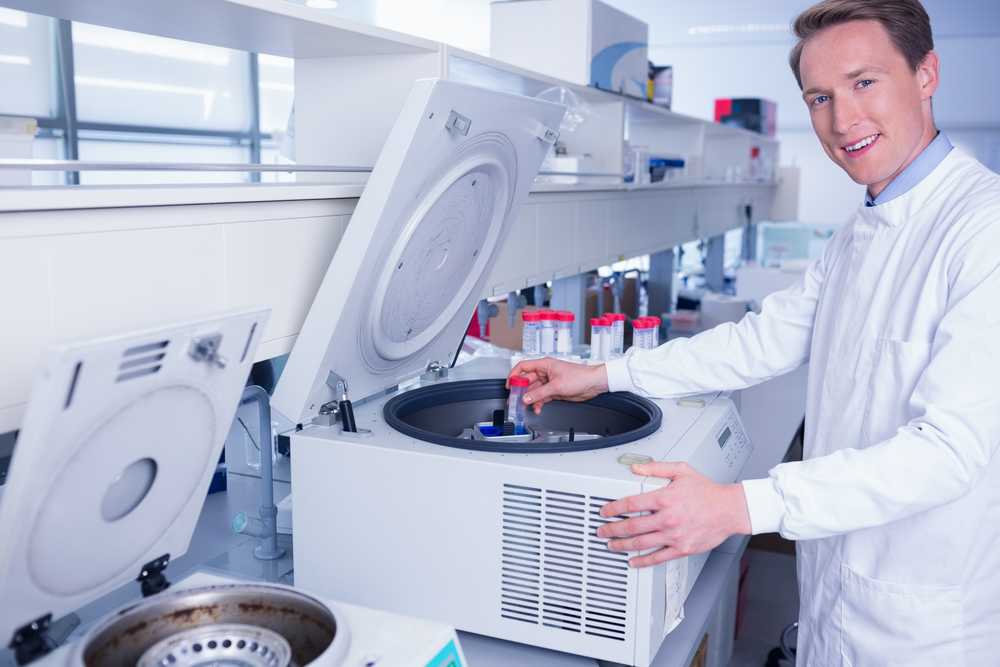
Write a comment
You must be logged in to post a comment.